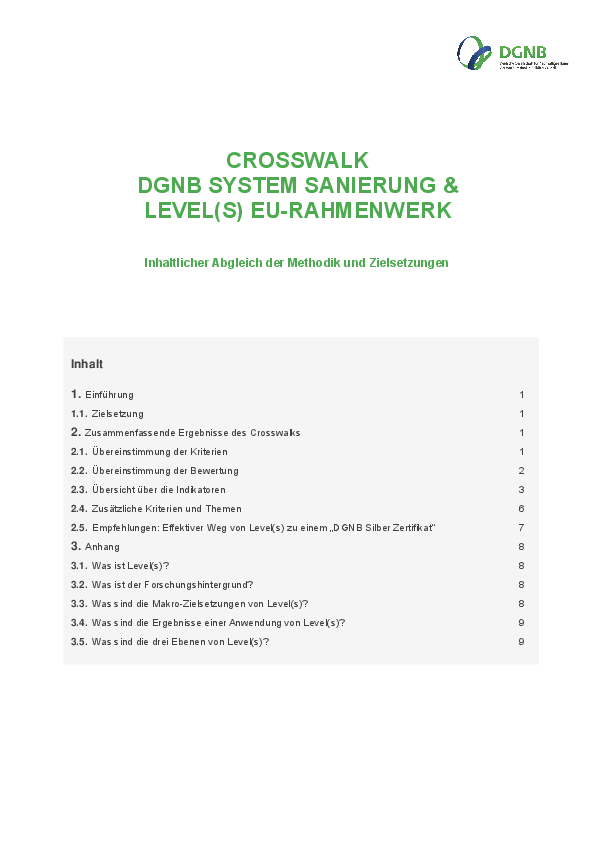The project and its objectives
The aim of the Life for LCA LCC Level(s) project, or LIFE Level(s) for short, was to make sustainable buildings in Europe more mainstream across EU member states through greater awareness and use of the Level(s) framework for reporting sustainability qualities of buildings, published in October 2020. The project was ended in 2022.
Level(s) is a voluntary reporting framework of common EU indicators to capture the life-cycle environmental performance of buildings. For the LIFE Level(s) project, the focus was on three indicators that promote climate change mitigation, long-term building performance and healthy indoor environments: life cycle assessment (LCA), life cycle costing (LCC) and indoor air quality (IAQ).
According to previous experience, it is a challenge for many actors from the building and real estate sector to apply these indicators in practice due to a lack of awareness, data or expertise. Therefore, the aim of the project was to develop concrete solutions together with stakeholders from the public and private sector on how to implement the mentioned indicators of level(s) across Europe. Furthermore, the aim was to create greater awareness among industry and public sector representatives of the relevance of the Level(s) framework and the life cycle approach in the context of addressing climate and environmental risks.
Sustainability-oriented planning and procurement
In the context of the project, it has also been explored why sustainability tools, in particular life cycle assessment, life cycle costing and indoor air quality assessments have not yet become standard in public procurement for construction projects. Against this background, the DGNB has worked with experts to develop a "Handbook for Sustainability-Oriented Planning and Procurement" that supports integration into practice.
In addition, a Best Practice Guide has been produced as part of the project, which looks at the European partner countries as well as Germany. Among other things, it contains a presentation of how the indicators have already been integrated into procurement in the respective countries. In addition, you find examples of public building projects that integrate at least one of the three indicators.
In order to support committed cities and municipalities as well as companies in implementing the three indicators in practice, another instrument was developed within the project: a declaration of intent in combination with a toolbox. With the help of the declaration of intent, one's own goals, priorities and measures with regard to the three indicators can be defined individually and adapted to one's own context and kept in view. In order to ensure that the goals set are followed by action and to facilitate implementation, practical tools and further information for the individual measures have been compiled in a toolbox.
Do you have feedback on the handout for us? We appreciate your support through your participation in the survey. The results will be used, among other things, to optimise our training offers, which will be developed within the framework of the project. To the survey
Pilot training courses carried out to promote sustainability qualities in public and private building projects.
Based on the project results, pilot training courses were developed and implemented to facilitate the integration of sustainability aspects into private building projects as well as public procurement in practice. The content focus was on the topics of life cycle assessment (LCA), life cycle cost analysis (LCC) and indoor air quality assessment (IAQ). The offers were aimed at representatives of the public sector, cities and municipalities, (specialist) planners, architects, building contractors and building product manufacturers.
The offer was funded within the LIFE Level(s) project (Grant Agreement number LIFE 18 GIE/ES/000911 Life for LLL(s)) as well as the #BuildingLife project and could therefore be carried out as a free pilot training. In the period from February to May 2022, more than 200 people were reached during the pilot training.
The developed training content is available to a wider audience in the form of DGNB information events and through integration into the DGNB Academy's training courses.
Duration and partners
In addition to the DGNB, the partners involved in the implementation of the project and the development of the results include seven other European Green Building Councils (GBCs): Green Building Council España (GBCe), Croatia GBC, Dutch GBC (DGBC), Alliance HQE-GBC, GBC Finland (FiGBC), GBC Italia and Irish GBC (IGBC). The project had a total duration of three years (from 2019 to 2022).
For more detailed information on the Level(s) framework as well as the project and partners, please visit the official project website. You can also receive up-to-date information on the project via the LIFE Level(s) newsletter or the DGNB Newsletter.

NOTE: This project has been funded under the LIFE Programme under Grant Agreement number LIFE 18 GIE/ES/000911 Life for LLL(s).
DISCLAIMER: The European Commission's support for the preparation of this publication does not constitute an endorsement of its contents, which reflects the views only of the authors, and the Commission cannot be held responsible for any use which may be made of the information contained therein.







